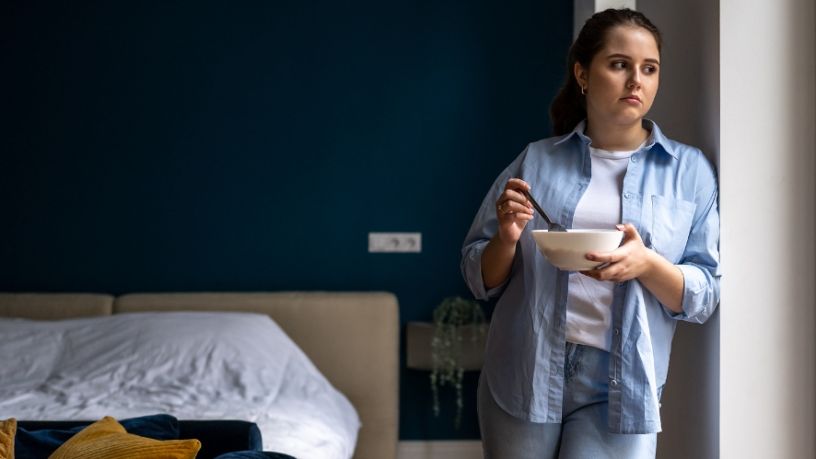There are in-person, online, and over the phone mental health support options available. Decide which one is right for you.
Key takeaways
Learn the ins and outs of the costs and processes involved in visiting a mental health professional.
Access a range of online and extra support from trusted mental health organisations.
If you’re in crisis or need immediate support, call 000.
Taking care of your mental health and seeking help when you need it are vital to help you cope with life’s challenges.
While many factors can contribute to mental health problems, one thing’s for certain: mental health and emotional disorders are common.1
While you might not hesitate to see a doctor if you’re injured or feeling sick, it can feel less straightforward when it comes to your mental health.
But help is out there, and no mental health problem is too big or too small. There are different types of mental healthcare professionals who can help with different problems, and understanding their roles is a good place to start.
But who, exactly, should you call?
Your GP
If you’re worried about your mental wellbeing, or something just doesn’t feel right, your GP is a great place to start.
GPs can help manage both your physical and mental health needs, and help you get more specialised treatment. They often work in partnership with mental health professionals and can help coordinate the healthcare services needed.
Your GP can also prepare a Mental Health Care Plan (also known as a Mental Health Treatment Plan), refer you to a suitable practitioner and prescribe appropriate medicines if required.
Psychiatrists
You may be referred to a psychiatrist, a mental health expert who specialises in diagnosing, treating and preventing mental illnesses and emotional problems.
As psychiatrists are medical doctors, they’re able to prescribe medication. They often specialise in particular areas of mental health, and typically assist in more severe or complex problems.
Psychologists
Unlike psychiatrists, psychologists are not medical doctors, which means they don’t prescribe medications to deal with mental illness or emotional problems.
However, psychologists are highly trained in dealing with a range of mental health issues, and might be the right option if you’re experiencing an issue such as anxiety, depression or a learning or behavioural difficulty.
Psychotherapists and counsellors
Counselling typically focuses on a specific problem or life difficulty, while psychotherapy, also known as 'talking therapy', uses different techniques to help you understand deeper and longer-term issues.
Many psychotherapists and counsellors have backgrounds in psychology, social work or nursing. However, it’s important to seek out an appropriately qualified practitioner as, unlike practicing psychologists and psychiatrists, registration for counsellors and psychotherapists isn’t mandatory.
Before you commit to a practitioner
Talking to a mental health professional for the first time isn’t always easy. But taking that first step is worth it.
Whichever practitioner you go with, it’s important to make sure their style of therapy suits your needs, and that you feel comfortable and safe with them.
Be sure to ask what to expect from your treatment, and take the time to consider whether you’re comfortable with that before you go in. Don’t be afraid to ask about their qualifications and skills, either (this might also be a good time to ask about their fees).
Referrals, costs and rebates
Whether you need a referral, plus the various costs and government assistance options, will vary depending on what kind of treatment you need, and whether you’re seeking public or private care.
You can discuss your options with your GP. However, for basic context:
- Psychiatrists: You will need a referral. If you’re eligible for Medicare, your treatment might be covered. However, total costs will vary depending on the kind of treatment you’re seeking (it may be free).
- Psychologists: While you won’t need a referral, it’s still worth talking to your GP as you may be able to claim a number of Medicare-rebated sessions under a Mental Health Care Plan (in which case you will need a referral).
- Psychotherapists and counsellors: You won’t need a referral for either, however you may be eligible for a rebate under a GP-referred Mental Health Care Plan with certain practitioners (where you will need one).
Online help and support
If sourcing information online is your thing, it’s important to look for reputable sources.
Government-endorsed information or websites from peak charity bodies or organisations are usually your best bet for accessing a variety of mental health information and support, such as help lines, support groups, online and telehealth support and evidence-based mental health apps.
We’ve put together a list to get you started:
THIS WAY UP
Bupa members with eligible coverage can claim free access to online mental health treatment from THIS WAY UP. Their education and coping tools are delivered through self-paced, online learning programs designed for people experiencing a range of mental health conditions, those living with chronic pain, or anyone wanting to improve their stress, sleep or general wellbeing.
Beyond Blue
Beyond Blue provides confidential 24/7 phone and online counselling services. While it focuses on supporting people with anxiety or depression and those who are feeling suicidal, it also provides great information, advice and support for anyone wanting to improve their mental health. This includes a free mental health coaching program for those feeling stressed or overwhelmed with everyday life.
Black Dog Institute
Black Dog Institute focuses on information and support for depression, anxiety, bipolar disorder, post-traumatic stress disorder and suicide prevention. There are also evidence-based digital tools and apps (which they develop themselves) available to help with mental health and wellbeing.
Head to Health
Head to Health is an Australian Government website that provides links and information to trusted online and phone support, as well as resources and treatment options for mental health, to help you pick the support that’s right for you.

Resources
If yours or someone else’s life is in danger, dial 000 immediately.
Lifeline Australia offers 24/7 crisis support online and on the phone at 13 11 14.
Beyond Blue offers 24/7 mental health information and support online and on the phone at 1300 224 636.
13YARN offers a national crisis support line for First Nations People on 13 92 76. The support line is available 24/7.
1800Respect is a 24/7 support service for people experiencing domestic violence. You can find support, counselling and information online or on the phone at 1800 737 732.
PANDA (Perinatal Anxiety & Depression Australia) supports the mental health of parents and families online and on the phone at 1300 726 306.
MensLine is a counselling service for men. You can get 24/7 support online and on the phone at 1300 78 99 78.
QLife offers LGBTQIA+ peer support online and over the phone on 1800 184 527.

At Bupa, trust is everything
Our health and wellbeing information is regularly reviewed and maintained by a team of healthcare experts, to ensure its relevancy and accuracy. Everyone's health journey is unique and health outcomes vary from person to person.
This content is not a replacement for personalised and specific medical, healthcare, or other professional advice. If you have concerns about your health, see your doctor or other health professional.
1Australian Government, Australian Institute of Health and Welfare. (2024). Mental health: Prevalence and impact of mental illness. Australian Government, Australian Institute of Health and Welfare.
You might also like...
A step-by-step guide to managing panic attacks
Panic attacks can happen at any time. Discover practical calming techniques and breathing exercises to manage a panic attack and ease your symptoms.
Orthorexia: Taking healthy eating to the extreme
We look at orthorexia, an obsession with certain so-called ‘healthy’ diets, which can lead to nutritional deficiencies or even malnutrition.
What's the difference between anxiety and depression?
Anxiety and depression are common mental health conditions in Australia. Learn about the different signs and symptoms and where to get help.
6 self-care tips to reduce anxiety this Christmas
The holiday season can be a difficult time for many of us, with grief, loneliness and stress overshadowing the festivities. Don’t let anxiety take over this Christmas with these tips.





